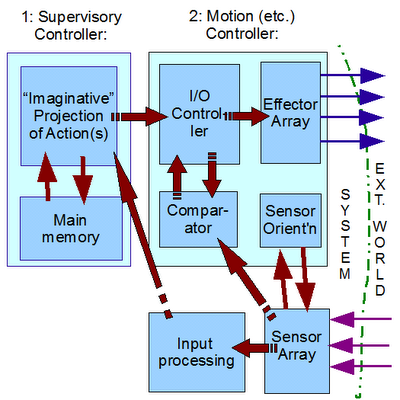In two recent UD threads, frequent commenter AI Guy, an Artificial Intelligence researcher, has thrown down the gauntlet:
Winds of Change, 76:
By “counterflow” I assume you mean contra-causal effects, and so by “agency” it appears you mean libertarian free will. That’s fine and dandy, but it is not an assertion that can be empirically tested, at least at the present time.
If you meant something else by these terms please tell me, along with some suggestion as to how we might decide if such a thing exists or not. [Emphases added]
ID Does Not Posit Supernatural Causes, 35:
Finally there is an ID proponent willing to admit that ID cannot assume libertarian free will and still claim status as an empirically-based endeavor. [Emphasis added] This is real progress!
Now for the rest of the problem: ID still claims that “intelligent agents” leave tell-tale signs (viz FSCI), even if these signs are produced by fundamentally (ontologically) the same sorts of causes at work in all phenomena . . . . since ID no longer defines “intelligent agency” as that which is fundamentally distinct from chance + necessity, how does it define it? It can’t simply use the functional definition of that which produces FSCI, because that would obviously render ID’s hypothesis (that the FSCI in living things was created by an intelligent agent) completely tautological. [Emphases original. NB: ID blogger Barry Arrington, had simply said: “I am going to make a bold assumption for the sake of argument. Let us assume for the sake of argument that intelligent agents do NOT have free will . . . ” (Emphases added.)]
This challenge brings to a sharp focus the foundational issue of counter-flow, constructive work by designing, self-moved initiating, purposing agents as a key concept and explanatory term in the theory of intelligent design. For instance, we may see from leading ID researcher, William Dembski’s No Free Lunch:
. . .[From commonplace experience and observation, we may see that:] (1) A designer conceives a purpose. (2) To accomplish that purpose, the designer forms a plan. (3) To execute the plan, the designer specifies building materials and assembly instructions. (4) Finally, the designer or some surrogate applies the assembly instructions to the building materials. (No Free Lunch, p. xi. HT: ENV.) [Emphases and explanatory parenthesis added.]
This is of course, directly based on and aptly summarises our routine experience and observation of designers in action.
For, designers routinely purpose, plan and carry out constructive work directly or though surrogates (which may be other agents, or automated, programmed machines). Such work often produces functionally specific, complex organisation and associated information [FSCO/I; a new descriptive abbreviation that brings the organised components and the link to FSCI (as was highlighted by Wicken in 1979) into central focus].
ID thinkers argue, in turn, that that FSCO/I in turn is an empirically reliable sign pointing to intentionally and intelligently directed configuration — i.e. design — as signified cause.
And, many such thinkers further argue that:
if, P: one is not sufficiently free in thought and action to sometimes actually and truly decide by reason and responsibility (as opposed to: simply playing out the subtle programming of blind chance and necessity mediated through nature, nurture and manipulative indoctrination)
then, Q: the whole project of rational investigation of our world based on observed evidence and reason — i.e. science (including AI) — collapses in self-referential absurdity.
But, we now need to show that . . .
Read More ›



